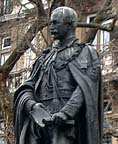 lthough Hobsbawm's "tools of Empire" had been available for decades as a result of the Industrial Revolution, it was not until this period that they were used extensively, as the so-called Age of Indifference, during which Britain was a satiated power, came to a close. Between 1870 and 1900 the formal Empire expanded to occupy an area of 4 million square miles, despite the lack of coherent imperial policies. Yet there is no simple explanation as to why such expansion took place during this period, and it is only through combination of the many factors, metropolitan and peripheral, which historians have suggested that the motivation becomes more apparent.
lthough Hobsbawm's "tools of Empire" had been available for decades as a result of the Industrial Revolution, it was not until this period that they were used extensively, as the so-called Age of Indifference, during which Britain was a satiated power, came to a close. Between 1870 and 1900 the formal Empire expanded to occupy an area of 4 million square miles, despite the lack of coherent imperial policies. Yet there is no simple explanation as to why such expansion took place during this period, and it is only through combination of the many factors, metropolitan and peripheral, which historians have suggested that the motivation becomes more apparent.
One such factor is the economic motivation of Britons, having a desire to defend the financial interests abroad of chartered companies founded earlier for individual financial gain — for example, Goldie's United Africa Company, Rhodes, and the British South Africa Company, and most famously the East India Company, founded as long ago as 1600. Whilst nominally still a company with shareholders and directors, in fact the East India Company had ceased to be trading company at all, and was instead authorised ruler of the vast Indian subcontinent. The markets for British goods opened up in such areas by these businesses, coupled with the vast resources of cheap raw materials to be found there, made defence of such interests of paramount importance.
Britain's informal empire was aided by the Industrial Revolution, which provided the tools of Empire, such as the Gatling Gun, the railway, and the steamship. Such technological advantages, according to Hobsbawm, "made the conquest of weak industrial people easier." Meanwhile the industrial revolution motivated the search for new markets, especially during the depression from 1875, when according to Hobson "greedy capitalists" preferred to invest in new areas than raise wages. This metropolitan explanation, however contentious, accurately indicates the importance of the economic potential of colonizable areas — something that all the European powers realized.
Indeed, the emergence of new powers, which appeared to rival Britain's economic and imperial supremacy, challenged both its financial and strategic interests. After 1871 newly unified Germany tipped the balance of power in Europe since Austria-Hungary was subordinate to it, whilst France sought to restore prestige after the Franco-Prussian War. Following the American Civil War, high wartime tariffs remained in the USA, and the new country looked likely to become an economic rival. A.J.P. Taylor justifiably construed European imperialism as a manifestation of the struggle for mastery: each country tried to tip the balance of power, and undeveloped areas provided an arena for competition. It was felt in Britain that the emerging Great Powers sought to emulate Britain's great power and status. Consequently, a largely unjustified sense of insecurity developed in Britain, which lead in turn to a desire to defend the British Empire.
Such challenges from other developing nations were one of the peripheral factors that, by threatening British interests, forced increasing colonial involvement and the official control. For example, the participation of Britain in the scramble for African colonies by European states was partially motivated by this competition. More important a factor, however, was the need to maintain order in profitable, if unstable, areas where informal companies were thriving. Such internal instability, however, often resulted from the presence of British influences in the first place or from the men-on-the-spot, such as Lytton in Afghanistan, whose aggressive policies towards threats to stability provoked further turbulence
As Gladstone's defence of the Suez Canal shows, such assertion of stability often required establish formal political control of a foreign country or region. In the case of the Suez Canal, Gladstone was forced to stabilise a country shaken by the turbulence caused by Arabi Pasha's nationalists, and hence in July 1882 British troops occupied Alexandria in order to protect the valuable trade link the Suez Canal. The irony of his defence was clear; he had warned in 1875, when Disraeli had bought the shares in the Canal, that it would require such protection. Nevertheless, following the Battle of Tel-el-Kebir, Sir Evelyn Barying was appointed Consul-General of the country. Ever the moral guardian, however, Gladstone asserted that he had acted to restore civilised Christian order to the country rather than extend Britain's influence or economic interests. Such reluctant or accidental imperialism was typical, and highly ironic in view of the parsimonious government policies of retrenchment that Gladstonian Liberalism embraced and which protectionary imperialism contradicted; in order to protect colonial markets and sources of materials, protectionist policies were adopted.
Gladstone's reluctance was in complete contrast to Disraeli's rhetoric of Empire as a pillar of Tory Democracy which would unite the classes, or "two nations of rich and poor," under the banner of imperial pride. This ideological viewpoint proved an important justification of imperialism, as Mackinnon and Rhodes cited what Kipling called "the white man's burden." This duty to exercise civilising influences on native peoples by providing stable government and justice was seen to be greatly to their benefit. Many, such as those who founded the British Empire League in 1894, felt this duty was a long-term justification for occupying an area, over and above economic motives, which might have been quickly exhausted. However, such federal imperialists achieved very little, something that Disraeli's having expanded the Empire less than Gladstone illustrates. Such trumpeting was often glorified rhetoric which came later than the initial economically motivated expansion. It was exemplified by Disraeli's seeking votes in the post-Alabama affair environment.


Two details of the Bartle Frere Memorial, Victoria Embankment, London. Click upon images to enlarge them.
Contrary to such talking-up of imperialist ideas, there was no planned expansionism during this period by the British. Deliberately aggressive policies were pursued only by European states or the men-on-the-spot such as Bartle Frere or Lord Lytton. Rather, the securing of markets and raw materials, especially in times of economic depression, was a crucial factor, especially when such markets were threatened by deliberately expansionist European nations or internal turbulence, often caused by irresponsible or greedy British presences themselves. Such a distinction between the rational, reluctant motives and aggressive, provocative imperialism was best made clear by Lord Rosebery, Liberal Prime Minister at the close of the period, when he said "sane Imperialism, as distinguished from what I may call wild-cat Imperialism, is nothing but this — a larger patriotism."
Last modified 5 April 2002